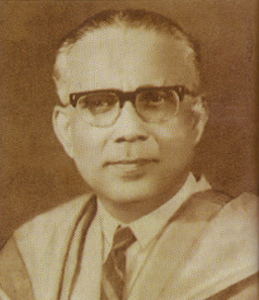
Professor Oliver Hector De Alwis Wijesekera
Vice Chancellor (1967)
Born to parents, both of the teaching profession, O.H. de A. Wijesekara started his school career in a bilingual school at Induruwa. He then spent a brief period at one of Galle’s leading schools, St. Aloysius College, and later gained admission to Ananda College, Colombo. He was destined to follow a different career path. At the University of Colombo, Dr G.P. Malalasekara, who was then head of the department of Sanskrit, Pali and Sinhalese was searching for talented young men to train them in various fields of Ideological and Buddhist studies, which were gaining recognition in the University. At the same time Venerable Rambukwelle Siddhartha Mahathera, Senior Lecturer in the Department was inculcating in his pupils a love for indigenous literature and the culture of the land. Dr Malalasekara was able to persuade him to take an interest in Pali Studies at the University. He specialized in Indo-Aryan Honours for the Degree and secured a First Class being also placed first among all the candidates who sat for the London University Examination in Arts, in 1932.
After winning a Government Scholarship on the result of a Final Examination, he proceeded to the School of Oriental and African Studies, in London and obtained his PhD. He took to the study of Sanskrit and Comparative Philosophy and Indian Philosophy, dipping also into Western Philosophy for purposes of comparison – all these subjects showing an important bearing in his research work. Specializing in Vedic and the Upanishads, he obtained a Master’s Degree and a Diploma from the School of Oriental Studies in Indian Philosophy. He returned to Ceylon, in 1936, and was appointed as an Assistant Lecturer in the Department of Sanskrit, Pali and Sinhalese where he found that his specialized knowledge of all three languages was a great asset. He contributed in no small measure, both by example and by guidance, to the stimulation of research in Indology and Buddhism at the University. He began to contribute learned articles on Vedic and Buddhist topics to the University of Ceylon Review of which he was one of the earliest Editors and also published papers in journals of international repute.
Dr Wijesekera actively contributed along with Prof. G.P. Malalasekara in conducting courses both at the University of Ceylon and Vidyalankara Pirivena for the Buddhist Monks with a view to initiate learned Buddhist monks, steeped in traditional knowledge, into critical and comparative studies of these subjects and as a pioneering effort to teach these subjects at an advanced level in the Sinhala medium at the University and outside. He was also a keen student of music and developed a special aptitude for classical Indian music and contributed articles on various musical topics to Sinhalese journals and weeklies. Another of his cultural interests was Sinhala drama which he avidly pursued from his days at Ananda. Later at the University, he wrote a few plays and produced them with acclaimed success.
When separate departments of Sinhalese and Sanskrit were created in 1943, Dr Wijesekera was appointed the Head of the Department of Sanskrit, and in 1948, he was appointed as the first Sri Lankan to the Chair of Sanskrit of the University of Ceylon. He served as Dean of the Faculty of Oriental Studies from 1956 and as Dean of the Faculty of Arts from 1963. In 1959, he was invited by the German Universities Association to deliver a series of lectures on Indology and Buddhism and delivered the annual Joachim Wach Foundation Lecture on Comparative Religion at the University of Marburg. In 1963, he served the University of Pennsylvania as a Guest Professor, lecturing on Indological subjects. During the next year, Prof. Wijesekera was invited by the Ministries of Culture in India and Japan to lecture at Universities in those countries. In 1966, he severed as one of the six-panel speakers at the XIth Conference of the International Congress for the History of Religions held at Claremont, U.S.A, where he contributed a paper on Hinayana Buddhism. He served as Visiting Fellow of Harvard University and Smith College, Northampton, Massachusettes.
In 1967, he resigned from his post at the University of Ceylon to accept the appointment as the first Vice-Chancellor of the new ‘University of Colombo’ but resigned from the post after a short period owing to a crisis which arose as a result of student agitation over the name and status of the University. In the same year, he was appointed Professor Emeritus of the University of Ceylon, Peradeniya. The University of Colombo honoured Professor Wijesekera by conferring the Degree of Doctor of Letters (Honoris Causa) in the year 1970. In later years he devoted more attention to the study of Religion paying special regard to Buddhism as a religion, motivated mainly by the requirements of teaching this aspect of the subject during his several assignments in American Universities. He has analysed and examined the data of early Buddhism in this light and presented the Religion and Psychology of Buddhism to students abroad in a scientific form.
Enjoying the peace and quiet of a retired life he has been devoting a good part of his time to research studies on Buddhism. Professor Wijesekera passed away on 1st February 1990. Professor Wijesekera has enjoyed as much success in his domestic life as in the academic sphere and it would be inappropriate, therefore, to conclude this account without referring to his wife who must necessarily share the credit for his achievements. She was one of his pupils at the University College, Colombo, a graduate in Indo- Aayan, who with her genial nature and understanding, has been an unfailing source of encouragement to him in all his activities. Our cordial wishes go to Ms Wijesekara and the family for their continued happiness in the future.
Source: Felicitation Volume edited by Professor Jayadeva Tilakasiri